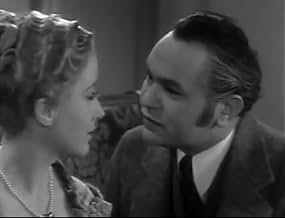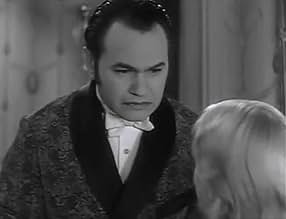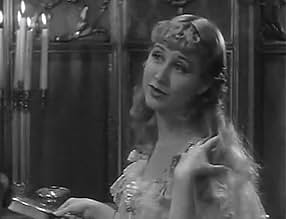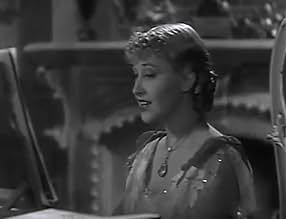Ajouter une intrigue dans votre langueArt student John Hayden interrupts his studies in Greece to head his father's meat packing business on his father's death. He marries social climber Martha who taunts him for his ideals rega... Tout lireArt student John Hayden interrupts his studies in Greece to head his father's meat packing business on his father's death. He marries social climber Martha who taunts him for his ideals regarding worker happiness and meat purity. He begins supporting the musical career of singer ... Tout lireArt student John Hayden interrupts his studies in Greece to head his father's meat packing business on his father's death. He marries social climber Martha who taunts him for his ideals regarding worker happiness and meat purity. He begins supporting the musical career of singer Laura. During the Spanish American war he sells the Army tainted meat. Martha puts detecti... Tout lire
- Réalisation
- Scénario
- Casting principal
- Récompenses
- 2 victoires au total
- Banker
- (non crédité)
- Doctor
- (non crédité)
- Banker
- (non crédité)
- Hayden's First Butler
- (non crédité)
- Voting Returns Announcer
- (non crédité)
Avis à la une
And how lucky we are that a film company like First National existed in the early 30's, pumping out films with stars like EG Robinson at a rate that would leave a current studio breathless. What an exciting time it must have been. We are the beneficiaries of this fascinating time, when studios had to release new films in a rapid succession, such was the hunger for new films.
"I Loved a Woman" takes place over a 40 year period, taking us from late Victorian Chicago of 1892 to industrial Chicago of just a few decades later. The fashions change subtly over the 90 minutes this film takes. While some of the romantic scenes with Kay Francis are a bit dated, and the lovers' dialogue a little stilted, Robinson never fails to captivate us when he is on screen. If anybody can carry this stuff off, it is him (Robinson even sings in this movie, though happily not too much).
The supporting cast is strong and full of First National perennials, such as Robert Barrat, playing EGR's father-in-law. A special treat is the speaking appearance of one of John Ford's silent screen favorites, J. Farrel MacDonald.
This movie also features a speaking role for Theodore Roosevelt, who personally threatens to destroy the meat packer Hayden for selling rotten meat to the soldiers of the Spanish-American War.
Perhaps the only annoyance is having to put up with Kay Francis repeatedly singing Home on the Range in an opera voice while playing an upright piano. Once, maybe, but three times?....
One funny thing to look for early in the film: Robinson returns home from abroad after hearing of his father's death. A painting of dad hangs on the office wall - looking exactly like EG Robinson with full whiskers! A very nice touch.
This is a strong entry from First National Films, and a great way to get know the many sides of Edward G. Robinson. I highly recommend this one.
John Hayden (Edward G. Robinson) is the heir to a meatpacking fortune and has just learned that his father has died. Despite claiming to being the champion of improved working conditions, wages and cleanliness, he spends the next few years leaving the company to essentially run itself while he devotes his energy towards raising a family. However, he slowly realizes that his company is going bankrupt AND his wife couldn't care less, as her father is the head of a group of meatpackers who are opposed to Hayden's STATED ideals. I say stated because during his absence from the company, he pretty much ignored his fine talk of running a progressive company.
Now with a company in trouble and a marriage a bit rocky, Hayden decides to run the company like the rest....or worse. Cleanliness and safe hygience mean nothing to him. In addition, he's got a new sweetie (Kay Francis) and his energies are focused on her and making millions...his wife, well, she's expendable. When war breaks out, he's more than happy to sell the government tainted meat for the soldiers! Nice guy, huh? If you haven't guessed, he's essentially a jerk!
So what did I like and not like about this film? What I didn't like was that Hayden changed so dramatically...too dramatically to make any sense. One minute he's a champion of the little people and a good husband, the next he's the opposite. His change was just too abrupt to be believable. On the positive side, the acting is very nice and the film has all the polish you'd expect from a Warner Brothers epic...though I could have done without all the times the film used "Home on the Range". Overall, decent but hardly among Robinson's best...and much of it is because no one in this film is likable and so you lose interest along the way. Plus, it never seems to know when to quit...so it's overlong to boot.
E.G.R, John Mansfield Hayden, scion of wealthy Chicago Meat-Packer returns from Greece to take over the business after his Father dies. Not really cut out for it he marries competitors daughter Martha Lane (Genevieve Tobin). Then meets his muse in aspiring opera singer Laura McDonald (Kay Francis). Now with confidence he builds a 'Empire of Meat' and if it means selling a defective product to the U.S. Army, so be it. In the end he is betrayed by his own ambition and lover. Living in exile in Greece (with his ill gotten gains) he escapes indictment, but his mind goes to the point he has no grasp of reality or his former love.
This story is right out of one of Socialist Upton Sinclair's muck-raking novels. THE JUNGLE (1906) being a prime example of the type. E.G.R. gives it his usual effort and is quite convincing as a turn of Century (19th/20th) 'Robber Baron'! Giving a performance the equal of Warren William, who usually filled that slot at the W.B. of the ruthless 'Business Tycoon'. Fine supporting cast backs him up and film runs in a crisp 90" so will not tax the modern audience. Watch it and be entertained.
Edward G. Robinson stars as John Hayden. The film opens in 1892 with him as a young man buying up all the art he can find in Europe, when he is called home at his father's death to take over the family packing business in which he really has no interest. He falls in love with and marries the daughter of a rival packer (Genevieve Tobin) and finds her exciting and thinks she is a reformer, but she soon transforms into just another social climber and their romance cools. When that happens he falls in love with an ambitious opera singer (Kay Francis), and offers to build her an opera house??? Now tell me that Orson Welles the teenager was not in the front row of the theater, chowing down on popcorn, and thinking how he might spruce up this tale when he got his big chance?
The similarities between the tales end there, and it turns out Kay Francis' character is no Susan Alexander Kane, and also the ignored wife turns out to be more persistent and vindictive than Kane's wife. The film is ultimately a variation on a common Warner Brothers' Depression era theme - a cautionary tale against greed for greed's sake.
Kay Francis may be second billed, but ultimately Edward G. Robinson is the whole show. Since Robinson was two inches shorter than Francis, it looks like the director came up with all kinds of inventive ways for them to embrace and it not look like she was picking him up off the ground to kiss him. Finally, why would anybody think "Home on the Range" would be a good tune to be "our song" for any couple? It's all part of the wonderful weirdness that was early 30s Warner Brothers. Recommended for the novelty of it all.
Le saviez-vous
- AnecdotesAlthough a novel by David Karsner is credited onscreen as the source, none has been located; it may not have been published. However, David Karsner's biography "Silver Dollar: The Story of the Tabors" was made into a film the previous year, also starring Edward G. Robinson named Valet d'argent (1932).
- GaffesThe newspaper item "10 Years Ago Today" near the end of the film stated that Hayden fled to Greece on the same day that the Chicago White Sox defeated Detroit, 10-6. But an item next to it noted that it was the 50th anniversary of the death of Scottish physicist James Clerk-Maxwell, which occurred in November 1879. Because the baseball season in 1919 ended in September, the anniversary of the White Sox-Tigers game could not have been on the same date as the anniversary of Maxwell's death.
- Citations
Charles Lane: John, you're mad!
John Mansfield Hayden: Yes. Maybe I am mad. But it's madmen who run the world today.
- Bandes originalesHome on the Range
(1904) (uncredited)
Music by Daniel E. Kelley (1904)
Lyrics by Brewster M. Higley (1873)
Played during the opening credits and at the end
Played on piano and sung by Kay Francis
Whistled and sung a cappella by Edward G. Robinson twice
Reprised by Kay Francis twice
Played by a band at the election celebration
Played as background music often as a love theme for John and Laura
Meilleurs choix
Détails
- Date de sortie
- Pays d’origine
- Langue
- Aussi connu sous le nom de
- I Loved a Woman
- Lieux de tournage
- Société de production
- Voir plus de crédits d'entreprise sur IMDbPro
- Durée1 heure 30 minutes
- Couleur
- Mixage
- Rapport de forme
- 1.37 : 1
Contribuer à cette page



































